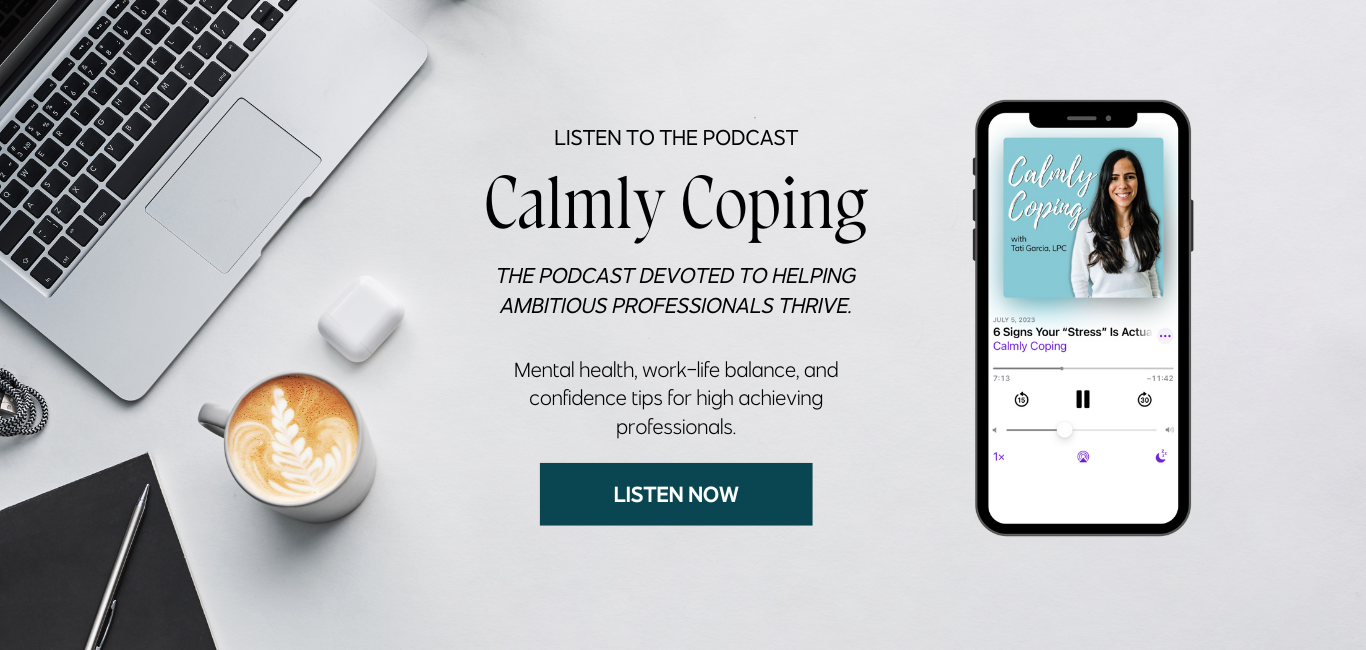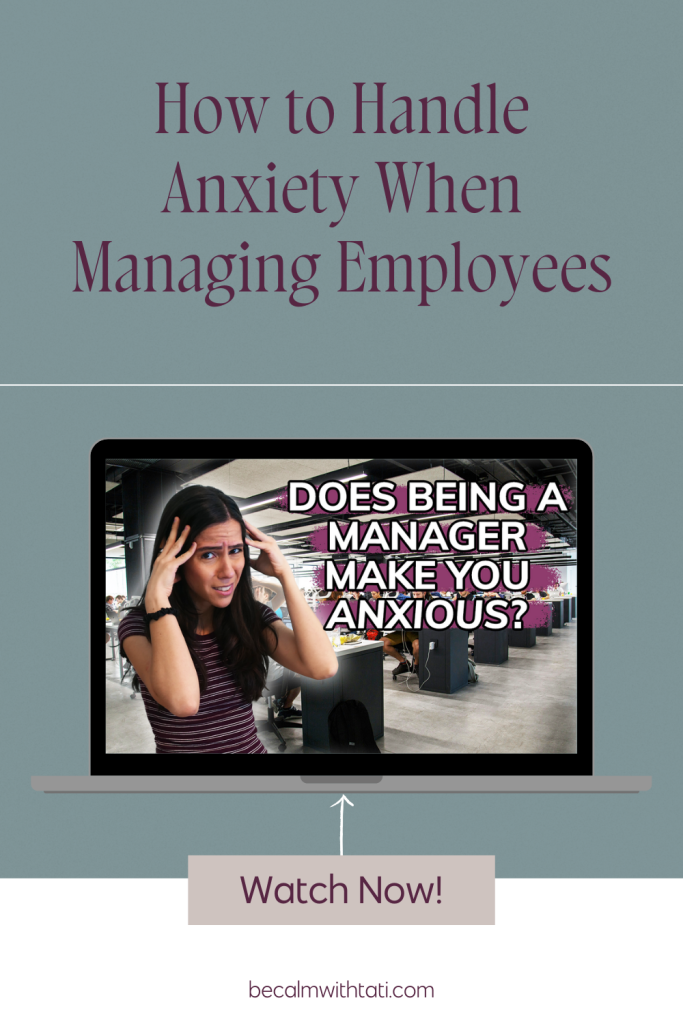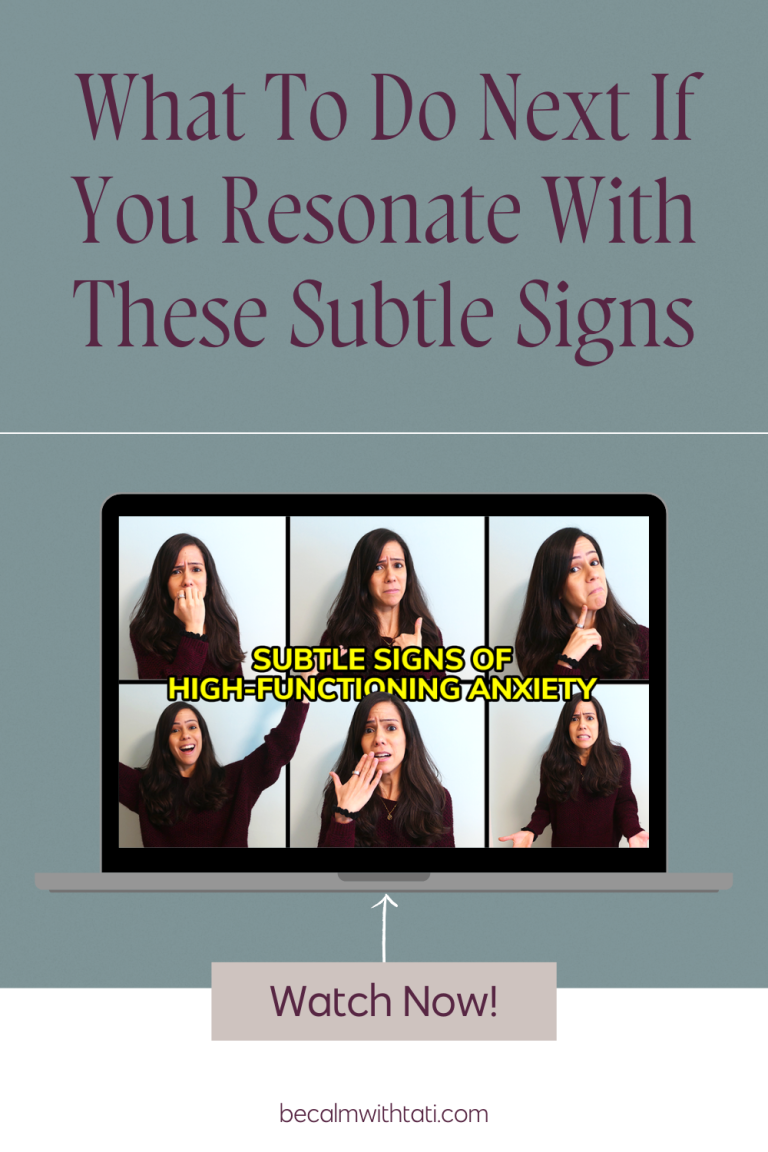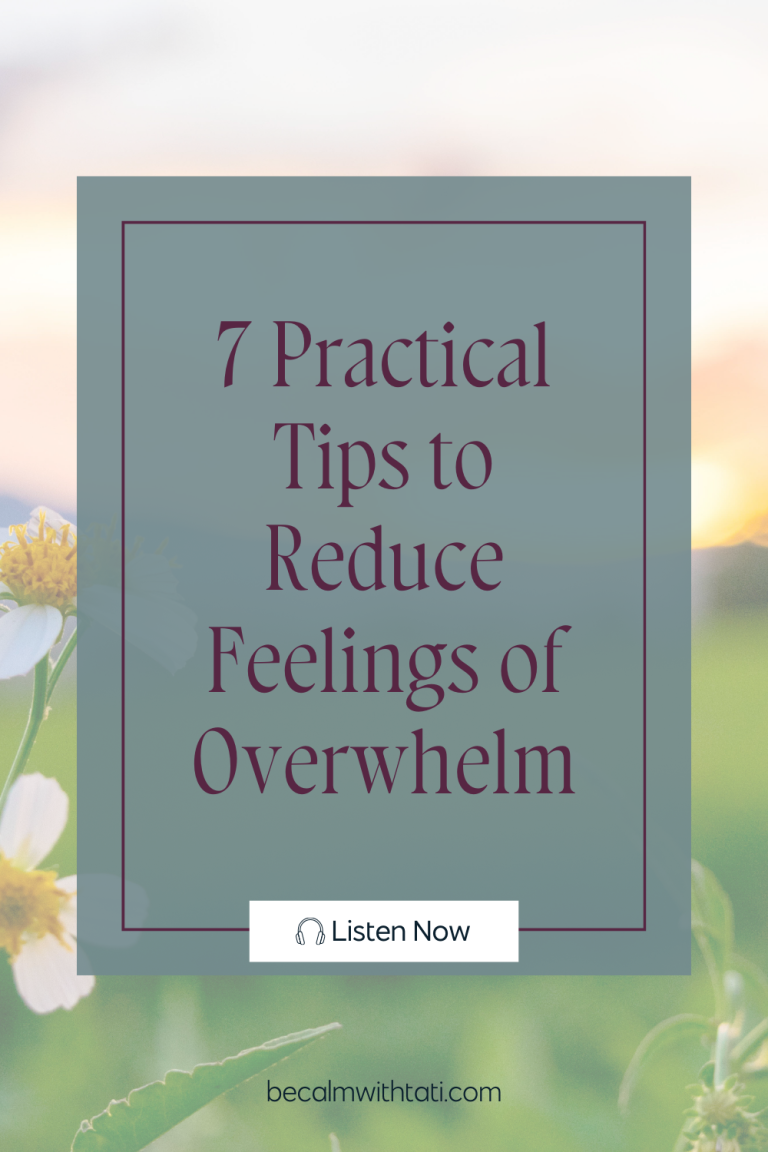Managing employees can be both rewarding and difficult; it can be difficult to set expectations, manage team performance, and make tough decisions under pressure, all while managing your own workload and responsibilities. This can lead to heightened anxiety and stress as a leader. In today’s episode, we’re focusing on how to navigate these challenges with practical strategies. From recognizing your triggers to building resilience, we’ll explore managing anxiety while maintaining effective leadership.
In this episode, you will learn:
- The unique challenges of managing employees and how that can trigger anxiety
- Actionable strategies to decrease anxiety as a leader
- How to implement an effective and positive management style
LISTEN NOW:
🎧 CLICK HERE TO LISTEN TO CALMLY COPING WHEREVER YOU LISTEN TO PODCASTS
WATCH NOW:
SUBMIT A MESSAGE, QUESTION, COMMENT OR SUGGESTION TO THE PODCAST: Message
FREE TRAINING: How to Create Work-Life Balance and Feel Calmer From Within
If you want to learn how to take back control of your life so you can feel calmer and more confident, and learn the tools to spend your time according to what matters most to you (no matter what your schedule is like right now)…

LISTEN, REVIEW, AND SUBSCRIBE TO THE PODCAST!

INTRO/OUTRO MUSIC: Rescue Me (Instrumental) by Aussens@iter (c) copyright 2018 Licensed under a Creative Commons Attribution (3.0) license. http://dig.ccmixter.org/files/tobias_weber/57990 Ft: Copperhead
DISCLAIMER: All content here is for informational purposes only. This content does not replace the professional judgment of your own mental health provider. Please consult a licensed mental health professional for all individual questions and issues.
Interested in diving deeper to get support for high-functioning anxiety?
I offer 1:1 coaching to help high-achievers overcoming high-functioning anxiety so they can feel calmer, more present, and have improved balance in their lives. Click here if you’re interested in learning more and getting started.
Calm, Balanced, & Confident is my comprehensive A→Z self-paced course to help high-achieving professionals overcome high-functioning anxiety so they can feel calmer, balanced, and more confident without the anxiety and overwhelm. Click here to learn more and enroll today.
Looking for ongoing support and guidance with high-functioning anxiety? The Calm & Ambitious Community is the exclusive community for high achievers with high-functioning anxiety. Click here to learn more and join us today!
TRANSCRIPT:
Click to view the episode transcript.
Managing employees can be both rewarding and difficult. It can be difficult to set expectations, manage team performance, and make tough decisions under pressure, all while managing your own workload and responsibilities. This can lead to heightened anxiety and stress as a leader. In today’s episode, we’re focusing on how to navigate these challenges with practical strategies.
From recognizing your triggers to building resilience, we’ll explore managing anxiety while maintaining effective leadership.
Welcome to Calmly Coping. My name is Tati Garcia and I’m a licensed therapist and coach specializing in high functioning anxiety. I help high achievers feel more calm, balanced, and confident from within so they can stop overthinking everything. If this topic interests you, then please like, subscribe, and hit the notification bell so you’ll be notified every time I release a new episode.
Thank you so much for tuning in. This episode was inspired by a comment that I received on YouTube. The commenter stated, Hello, I have been enjoying your videos. I’m wondering if you might discuss how to handle your anxiety when needing to manage employees. I’m self employed and work remotely and often feel like I’m bossing everyone around and spreading my anxiety to my team.
I thought that this was an excellent question. And so I I’m going to be addressing that in today’s episode because I think that can be a common experience of struggling with your own anxiety and then having that make it more difficult to manage employees as a result. This is an important skill set for anybody in a leadership role, even if you’re not specifically managing employees because you may have other people Transcribed under you or other people that you are communicating with or overseeing or in any capacity when you are somebody who is making decisions or in an upper level position, it’s going to be helpful to understand how to manage anxiety.
when you are managing other people, when you are interacting with other people and what that could potentially bring up. So the unique challenges that come with managing employees can be that there can be conflicts that arise and learning how to resolve those conflicts or a difference of opinion that can also look like managing performance and what does that look like whether you are working in person or working remotely.
How can you be somebody who is a supportive manager without feeling like you’re in that role of being bossy or constantly telling people that they’re doing things wrong or telling people to do things a different way, and also managing the team dynamics that can occur if you are managing a team and the inevitabilities that can come up when people of different personalities and different Um, perspectives and different backgrounds are interacting and working together.
So these types of responsibilities can trigger a leader’s anxiety because of the unpredictability. Anytime you’re dealing with other people, there’s going to be aspects that you cannot control as opposed to if you’re just doing your own work behind a computer or on your own. Um, Transcribed There’s going to be problems, difficulties that can arise that can feel like there’s a lot of uncertainty and a lack of control.
And so that can make it feel more difficult and trigger more anxiety because anxiety is triggered by uncertainty, by not knowing what could happen or worrying about what could go wrong. And so the more that there are people involved in variables that you don’t have control over, the more that that is going to result in anxiety.
And so we’re going to talk about how to approach that. And I’ll see you in the next video. So maybe you could be taught how to do the responsibilities for your role, but you’re not always going to be taught how to deal with different types of people or how to interact with people. And at the end of the day, although some people may find it easier to do, it is ultimately a skill that you can learn.
And when you are focusing on cultivating that skill, then that can help you to feel more confident in your role. So first let’s talk about what triggers can occur when you are a manager. Things that can trigger anxiety, can trigger stress. Some examples could be Delivering feedback to employees, dealing with employees who are underperforming, and handling team conflicts, like I mentioned.
I know, in my personal experience, I did not work as a manager for very long. I worked as a manager for about two years. It was long enough for me to realize that, it was not a good fit for me. And it was absolutely nothing about my team or the people that I was managing. It was mostly about the fact that it just took me further away from doing the work that I enjoy working one on one with clients.
And there was a lot of the extra administrative responsibility. And like I just mentioned, managing people, telling people when they’re underperforming or they need to improve things. That was something that I didn’t personally enjoy. And because that was a big part of my role, then. I just decided it was time to move on from there.
And I think just inherently it can be difficult to give people feedback, to tell people that they need to improve things. And especially if you’re somebody who tends to already be anxious, and maybe you’re already worried about what other people think of you. Then you might be in a place of that. I know I was worrying that.
Okay. I don’t want to be too harsh. I don’t want to constantly be correcting these people. I want to make sure that I’m also pointing out positive feedback and not just focusing on the negative. I want to boost morale within the team. So there can be this kind of Okay. conflicting or competing goals where you want people to perform well.
However, there’s also the necessity to provide feedback. And sometimes that can look like constructive criticism. Sometimes that can look like discipline, depending upon how the employee is doing. And that can be a challenging place to be in when you’re worried about hurting other people or worried about, you know, getting in some sort of conflict that could arise from that.
We’re going to talk about specific strategies, but that is one thing that can trigger anxiety in a management role. So it’s important for you to identify what your personal triggers of anxiety are in a management role. So is it that you can resonate with having difficulty with, uh, providing feedback, or is it like the person who left the YouTube comment, maybe you are working remotely and it feels really challenging for you to manage your team from a distance.
And so that distance can trigger more anxiety for you because you feel like you don’t have as much oversight. Or maybe it is moments of conflict or maybe it is having weekly team meetings and that’s a really uncomfortable role for you to be in. So there can be many different things. So what’s important is for you to identify for you personally, cause we’re all different.
What is it that’s challenging for you? What is it that’s triggering anxiety and going a layer deeper? So I always like to tell my clients and students, okay, this is what is triggering the anxiety for you. What is the layer beneath that? So if it is. that you feel anxious being in a leadership role at the head of a present of a meeting or presentation, then why is that?
So what is underneath that? So maybe you’re afraid that you’re going to make a mistake. You’re afraid that other people are going to judge you or you’re concerned about not being viewed as being competent. So identifying what is underneath that for you because that can help you to dissect a little more what’s really going on under the surface.
And also it can help you to recognize what are the signs that you’re feeling anxious personally. So maybe that can look like overthinking or maybe over rehearsing conversations or things that are coming up or maybe replaying them over and over again in your mind. So there is a level of preparation that can be helpful when it comes to something that you’re feeling nervous about or worried about.
However, if it’s something that starts to become really unhelpful and you’re kind of just going over the negative over and over again in your mind, that can be a sign that you’re feeling anxious about this thing. It can also look like avoiding difficult conversations. So maybe you know that you have to bring up something with an employee, but you just continue to put it off and put it off because you know that it’s something that’s going to feel uncomfortable for you or you anticipate that.
And so you just figure, all right, I want to kind of put this off as long as possible because I don’t want to do this. can also look like physical symptoms or discomfort. So maybe you are experiencing tension in your body. Maybe you’re having digestive issues. Maybe there’s a rapid heart rate or sweating or just that those general physical anxiety symptoms that can come up when you’re feeling uncomfortable or nervous about a situation.
And it can also look like focusing on or assuming the negative. So regardless of what the situation is, maybe you are hyper focused on what could go wrong you And assuming this employee is going to hate me and they’re never going to want to talk to me again because I’m bringing up this negative feedback, as opposed to the more realistic outcome that is, okay, maybe it’s going to be uncomfortable.
Maybe they won’t be the happiest to hear this. However, there can be a positive outcome that can come from that. And that is you being honest and being vulnerable can help to change the world. deepen that mentorship, that relationship, and also help your employee to improve and grow and progress. So now let’s talk about specific strategies that you can use to manage anxiety as a manager.
So one thing that kind of touches on what I said before, where maybe you’re somebody who’s over rehearsing or planning things in your mind or replaying them after the fact, intentional preparation can be helpful, but When it comes to handling difficult conversations. So maybe this looks like role playing this with your supervisor.
And if you’re finding that there is a disciplinary action that needs to be taken or a difficult conversation that needs to be had, maybe you can practice it with another person or maybe somebody from your from your personal life, a family member, friend, so that you can kind of go back and forth. You’re playing the role of yourself.
The other person’s playing the role of the employee to give yourself some practice because practice helps to build confidence because then that reduces the level of uncertainty going into the situation. And like I mentioned before, uncertainty is what increases anxiety. So if you can reduce that uncertainty by preparing, but not necessarily overpreparing.
You know, you don’t need to write a word by word script and come in and practice this, but it’s about practicing the gist of what you’re going to say so that you can feel more comfortable. Now, that doesn’t mean that writing down what you want to say can’t be helpful and can’t be helpful for you to get what’s in your mind out of your head and in a clear way, but You don’t necessarily have to go into this like you’re an actor playing a role and memorize things word for word.
So another strategy that can be helpful is using breathing techniques and mindfulness. And so these are strategies that can be helpful because When you’re feeling anxious, I mentioned those physical symptoms that can come up. Maybe it’s shortness of breath, maybe it’s the rapid heart rate, the tension in your body.
When you can slow down your breathing and take slow, deep breaths into your belly, it is something that is probably so cliche, maybe you’ve heard it a million times before, but really the reason is because it’s helpful. Because it helps to communicate to your brain and to your body that you are safe and it’s okay.
Rather than being in this state of things are going to go terribly wrong and I don’t know what I’m going to do about this. So you’re calming your mind and your body when you can slow down your breathing. Maybe this can look like relaxing the tension in your muscles. If you notice that your shoulders are up to your ears or you’re clenching your fists or your jaw.
Bring awareness to this and consciously release this tension as much as you can in your body. This can also look like mindfulness. And what mindfulness is, is just present moment awareness without judgment. That just means that you’re not stuck in your head overthinking things, but you are present in the moment.
And it’s not possible to be fully mindful 100 percent of the time, but if you can practice something such as maybe a brief guided meditation that you can find from the many meditation apps that are available now, if you’re interested, I have a link to my favorite one in the description, the show notes, wherever you’re watching this, and you can just practice this.
Doing one, let’s say for anxiety or for relieving stress. And that can help, especially if it’s before a difficult conversation to put you in a calmer state of mind, to help you to think more clearly, to help to calm any of those strong emotions that are coming up. This can be great to prepare for ahead of time.
Close your eyes. close your office door, even if you don’t have that privacy, putting on some headphones and going into the bathroom stall or whatever it is that you can do to help and give yourself some of that time and space to calm your mind and your body can help to prepare you for any of those difficult conversations or difficult moments.
Other things that can be helpful are professional development. So this can be. learning this can be Getting those skills because like I said, you’re not somebody who is born a manager It’s a skill that you learn over time and if you can seek out resources to help you to build those skills Then that can help you to feel more confident and less anxious.
So if it’s specific to managing from a distance. Maybe you can do some research, find an article or a specific podcast for managers that provides resources with that. There’s also specific publications such as Harvard Business Review is one that’s really helpful that I used to seek out when I was managing.
There’s books that you can seek out and I’m sure that It’s possible that maybe your agency or company has some resources to help you to build your management skills. Maybe you can check out courses on LinkedIn. So there are many places that you can look for education and this education piece can be really valuable in helping to build your confidence.
And when you build your confidence, then that can reduce some of that anxiety because it reduces the uncertainty. You’re building that skill that. Okay, when I’m handling a difficult conversation, then I’ll know how to approach this. So another strategy is to work on being a compassionate leader. And what does this mean?
So this means that you are understanding and supportive of your team. It doesn’t mean that you are babying them or enabling them. And it doesn’t mean that you’re being super harsh and critical. It is that middle ground of being supportive. while also providing constructive criticism and feedback. If it’s hard for you to give feedback, then what can really help is what’s called, you can use the compliment sandwich, or you could give criticism followed by positive feedback.
Just ensuring that you are focusing on pointing out what’s going well, just as much, or if possible, even more than what your employee or team is struggling with. Because We tend to, as humans, really focus on and hyperfixate on the negative, and it just naturally tends to be difficult to point out the positive.
However, people tend to perform well when they feel supported, when they feel like you’re recognizing them. This doesn’t mean that you need to point out every single little tiny thing, but it can look like, Maybe during a weekly meeting, if you have one with your employee or during a performance review, or even if you just notice that an employee does something really well, making sure to point that out, just being aware that that can also help your employee feel more supported and that can also help you feel like more of a compassionate leader.
Another practical strategy that you can use is asking your team, asking your employee or employees, how can I best support you? If you’re really kind of scratching your head, especially like the commenter said of, I’m working from a distance and it’s hard for me to Manage my own anxiety and manage my team.
So it’s not like you’re necessarily relying on your team to tell you how to be a manager, but it can be helpful to understand because everybody needs a different level of support and thrives on a different level of accountability and feedback. So when you can get somewhat of an idea that can give you a direction.
So if you know that one employee really finds that verbal feedback and is important for them to feel supported, whereas another is kind of like, good with doing things on their own, they’re not as reliant upon that, that can help you to manage and adjust your approach depending upon what that employee needs.
And that also reduces some of the uncertainty or the anxiety that can come up for you of I don’t know how to support this person or maybe trying to guess or make assumptions because we can often do that and that can leave us in a place of doing what we think it is might be helpful, but maybe isn’t necessarily what that person needs.
Now, again, this is something to. have a middle ground with as much as possible. You know, you don’t necessarily need to be super coddling and supportive, or on the other end, super strict and harsh, but it’s understanding what is it that matches. your management style along with what those employees needs are and how can you kind of find a way of managing that combines the two of those as much as you can.
And another practical strategy can be to seek out support. So getting support from a mentor, from a therapist, from your own manager, from maybe a friend of yours or a colleague who’s also a manager and can have maybe some helpful advice or similar experience. It’s always helpful, especially if you’re somebody who is in a role of maybe you’re self employed or maybe you don’t have much support around you within your agency as much as you can to seek out that support because that’s going to help you to feel as though you have an outlet for what your struggles are.
but also potentially get some insights and another perspective on the situation. And ultimately what is important is for you to develop your own management style. There is no one size fits all to being a manager. Each and every person is different. So that means that each and every manager is going to be different and going to have a different approach.
And it’s about learning more about yourself and your strengths so that you can provide that to your employees. And. Cultivate really what your strengths are as a manager and recognizing that you’re in this role for a reason And it is either because somebody else recognized it or is something that you were really passionate about and chose to do yourself or a combination of the two and so Recognizing that even though you might struggle with anxiety and self doubt that does not mean that those things are true And that that does not mean that you’re not qualified to be in the role that you are Recognizing and remembering your strengths can be really helpful to help you to cultivate and grow your own own management and leadership style, and then that can have a positive influence on your team, on your employees, because ultimately when it comes to workplace, I like to kind of think of the idea that the culture and the expectations trickle down.
And so you’re setting the expectation for the rest of your team, even through your nonverbal behavior, even through the decisions that you make or the actions that you take. And it’s not to say that you’re under a microscope and to be super clear. Like, hyper aware of that, but just recognizing that as a leader, you are somebody who other people are looking to, even if you may not even realize it.
If you’re interested in more support to create work life balance and to calm your anxiety as a high achieving professional, I have a free training on that, that you can take to It will guide you through the step by step process to help you to achieve calm balance and confidence as a high achieving professional.
You can learn more and sign up by going to calmlycoping.com/workshop or click on the link in the description or the show notes. And I have a new feature that I’m testing out where you can share your messages and your questions with me. So this is an example of a listener commenting a question and I address that.
So if you have a question related to anxiety, related to, high functioning anxiety, work stress, work life balance, burnout, any of the above, then those are things that I can address for you on the podcast. You can submit a voice message for me by going to calmlycoping.com/message. This can include maybe some feedback you have on this episode, some suggestions, anything that you want to share for me to share on the podcast.
So I’m looking forward to hearing from you through that. And I wanted to end on this quote by Simon Sinek. He is and author and inspirational speaker on business and leadership. So he says that leadership is not about being in charge. It is about taking care of those in your charge. Thank you so much for tuning in today.
If you found this episode helpful, I have other episodes on calming your mind, improving work life balance and increasing your confidence from within. You can check out these episodes here and thank you so much for tuning in today. Until next time, be calm.


Until next time…













